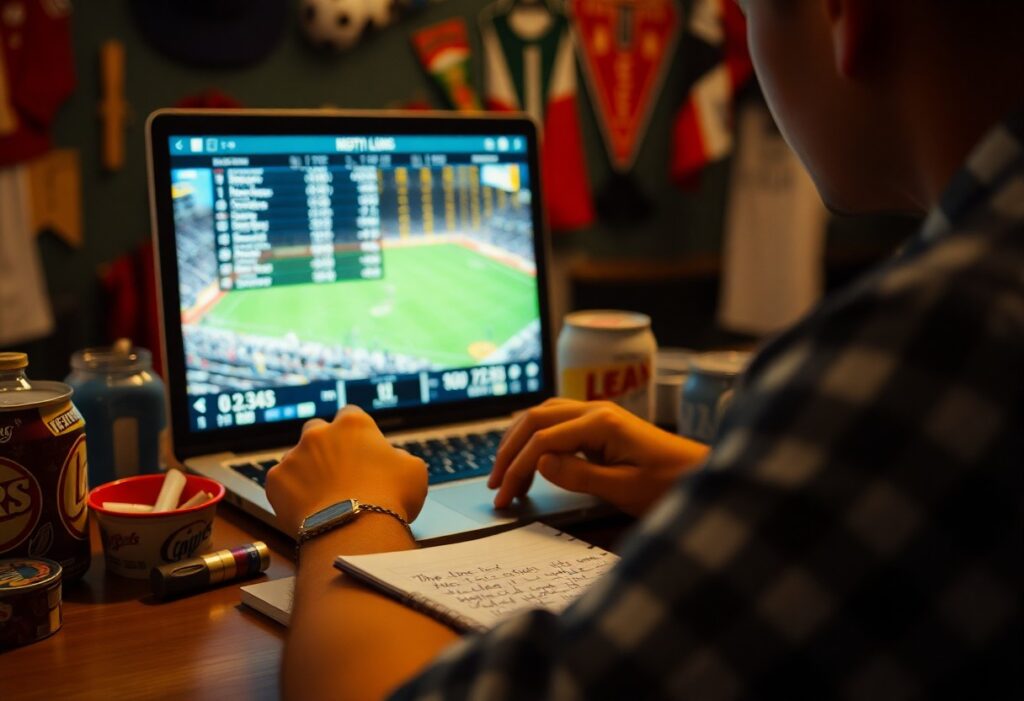
Just when you think you’ve got the hang of live betting, you might fall into some psychological traps that can derail your success. I’ll guide you through these common pitfalls and share my insights on how to dodge them. By recognizing these distractions and understanding your emotional responses, you can enhance your betting strategy and increase your chances of winning. Let’s investigate into these traps together and empower you to make more informed decisions in the fast-paced world of live betting.
Key Takeaways:
- Be aware of cognitive biases: Recognizing biases such as anchoring, overconfidence, and loss aversion can help prevent poor decision-making during live betting.
- Set strict limits: Establishing predetermined betting limits and strategies can help maintain discipline and reduce impulsive bets driven by emotions.
- Stay objective: Focus on statistical data and trends rather than getting swayed by the excitement of the game, which can cloud judgment and lead to hasty bets.
The Emotional Rollercoaster of Live Betting
Engaging in live betting often feels like riding a thrilling but unpredictable emotional rollercoaster. One moment you’re on top of the world, celebrating a lush payout after a successful wager, and the next, you’re grappling with disappointment as your predictions falter. This tumultuous experience can cloud judgment, leading you down a path of impulsive decisions that can sway your betting strategy dramatically and, ultimately, financially impact your bankroll.
Instant Gratification: Chasing the High
In live betting, the allure of instant gratification drives many enthusiasts to chase that rush following a winning bet. With every tantalizing moment of a match, it’s easy to succumb to the thrill and engage in impulsive betting that can derail even the best-laid plans. The dopamine rush from a win is addictive, making it easier to overlook critical analysis in favor of emotion-driven wagers.
Fear of Missing Out: The Urgency Trap
The fear of missing out (FOMO) can create a deceptive sense of urgency in live betting. As odds fluctuate rapidly, panic sets in, urging you to place a bet quickly lest the opportunity slip away. This urgency often leads to hedging bets on hunches rather than careful analysis, which can skew your betting strategy and result in unnecessary losses.
This trap becomes especially dangerous when you find yourself reacting to every shift in odds or using impulsive bets as a means of compensating for earlier loses. Each moment brings a new decision, which only amplifies the urgency and diminishes rational thinking. Ultimately, allowing FOMO to dictate your betting can lead not just to financial loss, but also emotional burnout from the stress associated with constant decision-making in a fast-paced environment. Staying grounded, taking breaks, and developing a clear strategy can safeguard against the pitfalls of FOMO and help maintain control over your betting experience.
Cognitive Biases That Impair Decision-Making
Cognitive biases can systematically distort my judgment during live betting, leading me to make impulsive and unwise decisions. Understanding these biases enables me to recognize when my thinking may be clouded and maintain a more analytical approach to my bets. From overconfidence to anchoring effects, these biases can skew my perception of risk and reward, making it necessary to arm myself with strategies to counteract these traps.
Anchoring: The Dangers of Prior Information
Anchoring occurs when I place excessive weight on the initial information I receive, often leading to misinformed betting decisions. For instance, if I see a team has a strong history against an opponent, I might unconsciously favor that data over the current context, like injuries or recent performance. This fixation on prior information can warp my analysis and costs me valuable betting opportunities.
Overconfidence Effect: Betting Beyond Your Means
The overconfidence effect can easily lead me to make reckless decisions based on inflated beliefs in my knowledge or skill. With my confidence peaks, I might wager amounts that far exceed my typical budget, believing that my analysis guarantees a win. Unfortunately, this bias often results in significant financial losses because I fail to adequately assess risks.
The overconfidence effect isn’t just about feeling good; it’s a pervasive trap. I may recall instances where my gut feeling paid off, reinforcing the belief that my intuition is always right. For example, I could reference a time when I accurately predicted an upset, leading me to increase my stakes in similar situations. However, relying on past successes blinds me to the reality that betting outcomes are inherently uncertain. Acknowledging this bias not only helps in setting realistic betting limits but also encourages a more disciplined, analytical approach that can ultimately safeguard my bankroll.
The Illusion of Control in Dynamic Environments
In live betting, the frantic pace of events can create a misleading sense of control. The rapid shifts in odds and outcomes may lead you to believe that you’re influencing the game in a meaningful way. This often results in overconfidence, as you might start making impulsive decisions based on your perceived ability to predict outcomes, rather than relying on data or analysis. The reality is that these dynamic environments are inherently unpredictable, and the belief that you hold sway over the unfolding drama can set you up for disappointing losses.
Misinterpreting Influence: The False Sense of Power
This false sense of power emerges when you mistake minor changes in the game for significant leverage. I’ve often found that recognizing pivotal moments—where my betting decision aligns with a player’s performance—can lead to a twisted perception of control. This cognitive misstep leads many bettors to chase their losses, drowning deeper into a world of compounded misjudgments.
The Dangers of Confirmation Bias: Ignoring Key Changes
Confirmation bias can cloud your judgment by making you focus only on information that supports your current bets while disregarding crucial developments. For instance, I might have a strong belief in a particular team, which causes me to overlook crucial injuries or momentum shifts during the match. Missing these vital pieces of information could lead to missed opportunities or significant losses.
This danger becomes evident when I’m engrossed in the action but fail to acknowledge objective indicators that could sway the outcome. If my favorite team shifts in performance due to an unexpected player injury, yet I stubbornly stick to my bets, it can blind me to potential risks. Acknowledging only the factors that favor my existing decisions not only limits my perspective but may also lead to significant losses in live betting scenarios. Staying adaptable and willing to reassess my positions in light of new information is vital for success in this unpredictable betting landscape.
Strategies to Stay Objective and Clear-headed
Maintaining clarity during live betting is crucial for making sound decisions. Developing a focused mindset helps prevent mistakes driven by emotions. I often find that employing strategic approaches, such as pre-betting assessments and cooling-off periods, can significantly enhance my ability to remain objective. By implementing these methods, it’s possible to keep emotions at bay and make rational choices during the highs and lows of live betting.
Pre-Betting Assessments: Setting Limits and Guidelines
Before placing a bet, I always establish clear limits and guidelines regarding bankroll management. This involves setting a specific amount I’m willing to wager on a single event or across a betting session. By defining these parameters ahead of time, I can avoid impulsive decisions driven by excitement or frustration. Implementing this disciplined approach helps me stay aligned with my overall betting strategy and financial goals.
Implementing a Cooling-off Period: Strategies for Resilience
A cooling-off period serves as an crucial tool for building resilience in live betting. By allowing myself time to regroup, I reduce the chances of making impulsive decisions after a winning or losing streak. I set a standard time frame—often just a few minutes—to step back, reflect, and reassess the situation. This technique has helped me maintain a level head and a better perspective on the unfolding events.
During a cooling-off period, I take time to breathe, hydrate, and distract myself with light activities to clear my mind. For instance, I might step away for a quick walk, listen to music, or engage in a non-betting-related task. This helps redirect my focus away from the intense emotions of immediate betting outcomes. In my experience, returning to the platform after this brief respite allows me to re-enter with a refreshed mindset, which can lead to more rational decision-making and better outcomes overall.
Navigating the Social Landscape of Live Betting
Being aware of the social dynamics at play during live betting can greatly influence your strategies. Social interactions, whether they’re with friends or the broader betting community, can affect your judgment and choices. Often, the opinions and bets of fellow bettors may sway your decisions, sometimes positively, but other times leading you down a less rational path. It’s vital to remain conscious of these social pressures and maintain your focus on informed decision-making.
The Impact of Peer Influence: Betting with the Crowd
Peer influence in live betting can lead to herd behavior, where you might unconsciously follow the crowd’s sentiment instead of relying on your own analysis. This can result in missed opportunities or poor decisions, especially if the majority are swayed by emotion rather than logic. Understanding that the consensus doesn’t always equate to accuracy enables you to stay objective and make better bets.
Leveraging Expert Opinions: Filtering Noise from Value
Expert opinions can be invaluable in live betting, but not all expert insights are created equal. I sift through various sources to determine which analysts provide data-driven insights and enhance my understanding of the game. In a fast-paced environment, the key is to identify reliable experts whose predictions aren’t just sensationalized but stem from substantial experience and statistical analysis.
Diving deeper into expert opinions helps in distinguishing between valuable insights and mere noise. For instance, I always prefer analysts who offer not just predictions but also the reasoning behind their insights, supported by relevant statistics. An expert whose predictions align with current game trends or data trends tends to have a more accurate track record. Doing my homework ensures that I capitalize on real value rather than getting swept up in hype or fear driven by the crowd’s reactions. This approach not only sharpens my decision-making but also refines my understanding of the betting landscape as a whole.
To wrap up
Now that we’ve explored the psychological traps in live betting, it’s necessary to stay alert and recognize these tendencies in ourselves. As I’ve discussed, overconfidence, emotional decision-making, and the urge to chase losses can all lead to poor outcomes. By being aware of these pitfalls and implementing strategies to keep your emotions in check, you can improve your betting experience significantly. Trust in your analysis, maintain discipline, and don’t let short-term outcomes sway your judgment for long-term success in live betting.



